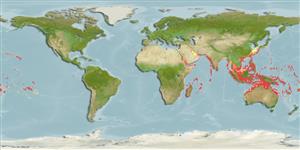Common names from other countries
>
Eupercaria/misc (Various families in series Eupercaria) >
Lethrinidae (Emperors or scavengers) > Monotaxinae
Etymology: Monotaxis: Greek, monos = one + Greek, taxis = disposition (Ref. 45335).
More on author: Forsskål.
Environment: milieu / climate zone / depth range / distribution range
Sinh thái học
Biển Cùng sống ở rạn san hô; không di cư; Mức độ sâu 0 - 100 m (Ref. 9710), usually 5 - 30 m (Ref. 9775). Tropical; 35°N - 30°S, 32°E - 122°W
Indo-Pacific: Red Sea and East Africa to the Hawaiian Islands and southeastern Oceania, north to Japan, south to Australia.
Length at first maturity / Bộ gần gũi / Khối lượng (Trọng lượng) / Age
Maturity: Lm 27.5, range 18 - ? cm
Max length : 60.0 cm TL con đực/không giới tính; (Ref. 2295); common length : 40.0 cm TL con đực/không giới tính; (Ref. 2295); Khối lượng cực đại được công bố: 5.9 kg (Ref. 40637)
Các tia vây lưng cứng (tổng cộng) : 10; Các vây lưng mềm (tổng cộng) : 10; Tia cứng vây hậu môn: 3; Tia mềm vây hậu môn: 9. This species is distinguished by the following characters: body oblong, greatest body depth of adults about 2.2 in SL; head profile strongly convex in front of eye, the snout sloping steeply; eye large 2.7 (juveniles) to 3.8 (adults) in HL; inner surface of the pectoral fin base is densely scaled; pectoral rays usually 14; caudal fin forked with pointed tips; lateral line scales 44-47; scale rows above lateral line (to base of middle dorsal spines) 5, below (to origin of anal fin) 13.5; side of jaw with row of 5-7 molariform teeth. Color of adult silvery grey with narrow dark scale margins, lips yellowish, a large black blotch covering pectoral fin axil, quick to assume pattern of 4 broad, blackish bars on body, the pale interspaces covering 3-4 scale rows; juveniles with black bar through eye, body with 3 dark brown to blackish bars with the 2 posterior bars extending onto the dorsal fin, and each lobe of caudal fin with an orange band (Ref. 2295, 90102).
Found in sand and rubble areas near coral reefs. Solitary fish are often encountered, but large adults usually form aggregations of up to about 50 individuals (Ref. 9710). Solitary or in groups (Ref. 90102). Benthopelagic (Ref. 58302). Nocturnal feeders (Ref. 9710). Feed mainly on gastropods, ophiuroids, and echinoids. Pagurids and brachyuran crabs, polychaetes, tunicates, and holothurians are consumed in lesser quantities. Caught mainly with gillnets, traps, spears, and handlines (Ref. 2295). Marketed fresh (Ref. 9775). Ciguatoxic in Marshall Is. (Ref. 171). Minimum depth reported taken from Ref. 128797.
Carpenter, K.E. and G.R. Allen, 1989. FAO Species Catalogue. Vol. 9. Emperor fishes and large-eye breams of the world (family Lethrinidae). An annotated and illustrated catalogue of lethrinid species known to date. FAO Fish. Synop. 125(9):118 p. Rome: FAO. (Ref. 2295)
IUCN Red List Status (Ref. 130435)
CITES (Ref. 128078)
Not Evaluated
Threat to humans
Reports of ciguatera poisoning (Ref. 4690)
Human uses
Các nghề cá: Tính thương mại; cá để chơi: đúng; Bể nuôi cá: Tính thương mại
Các công cụ
Special reports
Download XML
Các nguồn internet
Estimates based on models
Preferred temperature (Ref.
115969): 24.6 - 29.1, mean 28 (based on 1440 cells).
Phylogenetic diversity index (Ref.
82804): PD
50 = 0.7500 [Uniqueness, from 0.5 = low to 2.0 = high].
Bayesian length-weight: a=0.02188 (0.01670 - 0.02866), b=2.95 (2.87 - 3.03), in cm Total Length, based on LWR estimates for this species (Ref.
93245).
Mức dinh dưỡng (Ref.
69278): 3.4 ±0.0 se; based on diet studies.
Thích nghi nhanh (Ref.
120179): Trung bình, thời gian nhân đôi của chủng quần tối thiểu là 1.4 - 4.4 năm (Preliminary K or Fecundity.).
Fishing Vulnerability (Ref.
59153): Moderate vulnerability (44 of 100).
Climate Vulnerability (Ref.
125649): Very high vulnerability (76 of 100).
